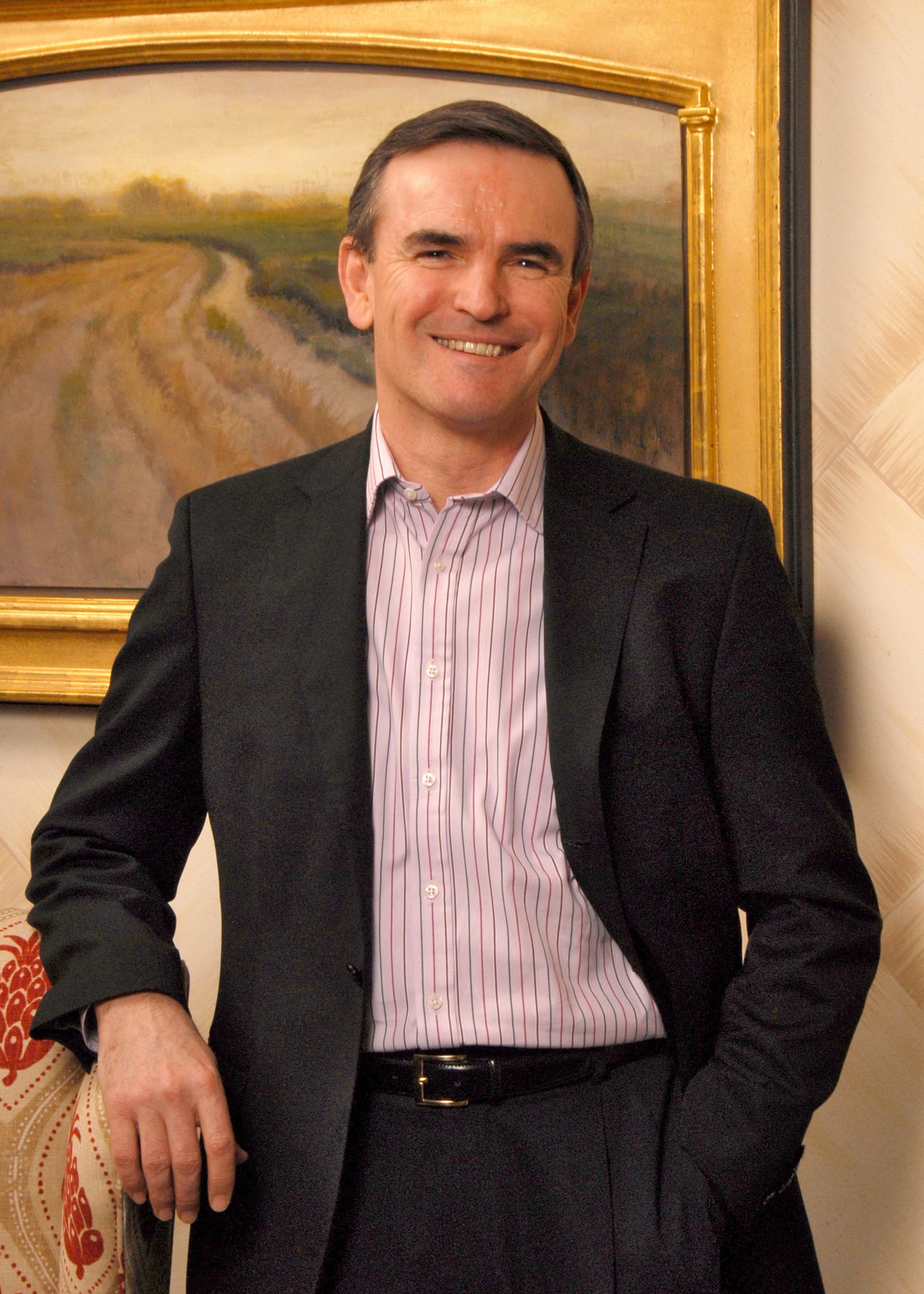Around the Barrel - Transcript: Ep021 Mark McCallum
Mark McCallum: I've been working 40 some years now in this game of consumer brands, and I've not yet struck a brand with the multi-country resonance that Jack Daniel's has.
Lucas Hendrickson: The word icon probably gets thrown around a little too easily these days. It takes time, effort, skill and talent to move something into the active role of icon. It doesn't happen accidentally, and it doesn't happen overnight.
Mark McCallum knows a little something about working with a true icon. As part of the leadership team at Brown-Forman, the parent company of Jack Daniel’s, Mark has played a pivotal role in firmly establishing the global footprint of Jack Daniel’s.
On this episode, we talk with Mark about the new brands that have emerged under the Jack umbrella during his watch, the challenges of getting certain audiences to believe some of the lore of Lynchburg and how some time spent with a knife, a piece of wood and a little patience can yield relaxing results Around the Barrel.
Welcome back to Around the Barrel, the official podcast from the makers of Jack Daniel's. I'm your host, Lucas Hendrickson. We've spent a good deal of time talking with the folks who make the world's favorite Tennessee whiskey, but there's another equally important element to getting that instantly recognizable square bottle into stores and, ultimately, your hands.
Mark McCallum is currently executive vice president and chief brands officer for Brown-Forman, the Louisville, Kentucky, based company that has owned the Jack Daniel Distillery since 1956. Mark joined Brown-Forman in 2003 after successful stints working with companies in the food space at posts around the world.
During his tenure, he's helped expand the number of brands under the Jack name plate and shepherded those brands into markets all over the globe. The mere fact that Mark isn't, as you’ll note as soon as he speaks, from around these parts has given him a unique perspective on how to tell the Jack Daniel's story to friends far and wide. But he also appreciates the heart and soul the Distillery’s home in Middle Tennessee brings to the brand, as well as the new skills he's picked up spending time on a porch there whittling.
Mark: G’day, my name is Mark McCallum. I’m the chief brands officer here at Brown-Forman. I was born in Maryborough, Victoria, in Australia and came to America in 1997, and I've been here ever since.
Lucas: Mark McCallum, thanks for joining us Around the Barrel. We are sitting in your office at the Brown-Forman headquarters in Louisville, Kentucky, talking about your role and your impact on the company over the 16 years you've been with it.
As we were talking before we started recording, for the global perspective of not only Jack Daniel's, but now the larger Brown-Forman portfolio, what are the kind of things you have been able to implement as part of that, especially on the Jack Daniel's side? What did you see as you were joining the company and were charged with expanding that global footprint for it? And how are you feeling about it now a decade and a half down the road?
Mark: Well, I think the story of Brown-Forman, particularly in the modern era is very much defined by the story of the continued growth of Jack Daniel's.
For the 15 years or so that I've been here, we have been moving away from a predominantly U.S. based company. Back in 2003, probably 80 to 85 percent of our business was here in the U.S. Today, about 45 percent of our business is in the U.S. and 55 percent of it is now outside the U.S., and that has been very much driven by the globalization of the Jack Daniel's brand.
Lucas: Where have you seen the most uptick in sales for the brand throughout the world?
Mark: Well, that's been very broad. It's been everything from the ones you'd expect: white English speaking, so from Australia, England, the U.K. and New Zealand to core European countries like Germany and France.
So, I would say the broad appeal of Jack Daniel's is just that. We have a wonderful business that's growing in emerging markets around the world and a business that's well established now in a number of what we'd call more developed markets.
Lucas: Right. What have been the major challenges in trying to get into those emerging markets and develop a fan base there? Obviously, Jack Daniel's has such a great presence in duty-free shops and travel markets around the world, but what about trying to build those emerging markets going forward?
Mark: Yeah. It's a great question because it depends. I mean, there are a number of markets, and let's use Russia as an example, where because of both import duties and the equivalent excise tax, or a tax on alcoholic beverages in those countries, the price of Jack Daniel's can be, instead of around $20 to $25 here in the U.S., anything from $40 to $70 a bottle. So, by definition, that starts to say there's a smaller group of consumers who are able to afford that. There are markets like that.
Lucas: Right. Do you do parallel marketing messages in those markets to place it as a luxury brand to be able to get in front of those consumers in those markets? The awareness distribution of any sort of product anywhere around the world is obviously crucial to that ultimate success.
Mark: No. I think that's one of the challenges for the local teams, to get their heads around the fact that even though it may be priced at what they might call a luxury price, Jack Daniel's has to be built the way Jack Daniel's is. Staying true to the brand and true to what I'd call the grittiness or the flawed hero type persona of the Jack Daniel's brand is critical.
If I look back over the last ten years in Turkey or in Brazil or in China or in Russia, I’m trying to let them know that we’re patient, that we build this brand the same way. It doesn't matter what country it's in.
Lucas: Right. How many of those core teams do you have around the world right now?
Mark: Oh, gosh. I’m estimating we have a Brown-Forman presence in excess of 40 or 50 countries now, and we have distributors in countries beyond that.
Lucas: Right. How did you come to know about the brand? What was your first exposure to it? What made you interested in coming along for the ride and driving the boat in a lot of ways with this brand?
Mark: Even from Australia and my time in Hong Kong, even though I might've been in the soup business, I was very aware of the on-premise world. Jack Daniel's is a brand that I've seen everywhere I've ever been in the world, even before I came here to work at Brown-Forman.
So, the opportunity to work on a brand that is one of the most global consumer brands that I've ever bumped into – I've been working 40 some years now in this game of consumer brands, and I've not yet struck a brand with the multi-country resonance that Jack Daniel's has.
Lucas: That idea of every drop emerging from one place – how does that story resonate with markets around the world?
Mark: Well, we've got evidence that, for instance, across a number of markets in Europe, only about half the people even believe it. So, one of the jobs we do is we just continue to tell the stories in the way we tell them, and if we can get them to Lynchburg or if we can get them some way of understanding what's happening in that little town in Middle Tennessee, then we've got a fan for life once they know how true that claim is.
Lucas: Sure. How important is Lynchburg to the brand, and what's your favorite part of spending time down there, among the folks that have boots on the ground working with this product every single day?
Mark: Well, Lynchburg is not just important. It is the soul of this brand, Jack Daniel's, and everything that Lynchburg and Moore County represent over 150 plus years. It is the primary reason that the brand is what it is today.
I love to go down there, and I was taught to whittle by one of my friends down there, a guy named Tommy Salinger. He taught me to whittle about 10 or so years ago. Every time I go down there, which is not enough, I can sit on the stoop with him and do a little bit of whittling and listening.
It's a quiet place. There's nothing more calming and perhaps reassuring that all is okay in the world than to go and spend a day in Lynchburg.
Lucas: Right. You have been involved in the company as it has expanded its portfolio of brands underneath the Jack Daniel's Old No. 7. When you started, it was just Jack and Gentleman Jack, correct?
Mark: In the Jack Daniel's business, yes.
Lucas: Right. The brands that have emerged, the Tennessee Fire and Tennessee Honey with the Rye Whiskey, the Sinatra and the Gold No. 27, and the number of brands that have come out underneath that – how important have those been to the overall idea of Jack Daniel's around the world? What have been the challenges of developing those things that fall under that umbrella, but can draw in customers from different market segments that maybe don't drink Old No. 7 on a regular basis?
Mark: Yeah. It's true. Your last comment is very true, Lucas. There are a number of folks who like and love our brand who, in the past, have not had many options in terms of consuming our brand because they didn't like 80 to 90 proof American whiskey.
A lot of the reason we've been carefully thinking as we innovate around new products is just that. It's, “How do we offer the brand Jack Daniel's in a variety of different ways in support of the ethos of the brand and have people be able to enjoy the brand as well as others?”
It's been really important. I mean, we've expanded the consumer base of Jack Daniel's brands exponentially as we've globalized and as we've continued to grow here in the U.S.
Lucas: Across the course of this show, we have talked to a number of people with deep historical knowledge of the company, between Nelson Eddy and Jeff Arnett in his current role. As you've been involved in the company, learned about its history and that uncommon knowledge idea you talked about before, what has been one of the more impactful or significant things about the history of the company that has emerged for you?
Mark: Yeah, I think the biggest memory I have of it is the actual business side, the globalization of Jack Daniel's and the incredible growth it's seen over the last 15 years in particular.
Maybe one of the most significant developments that I have been close to has been the amplification of the story of Nearest Green and his role in teaching Jack Daniel how to make whiskey, and now acknowledging in the last three years Nearest’s role as our first Master Distiller. The commentary and the discussion that has elicited throughout our company, throughout Lynchburg, Tennessee, and reasonably, out in society over that time has been a great learning curve for myself and for the company as well.
The fact that Fawn Weaver and her team did the research that they did and shared that with us, educated us and guided us along the early part of that journey was one of the most interesting and impactful times of my 15 years here.
We're still working on, internally, how to continue to amplify that story in ways that honor that partnership between five-foot-two Jack Daniel, a white man, and Nearest Green. We haven’t got a photograph of Nearest, but those two together in the late 1800s and the early 1900s were a hell of a story, and now that we know it as well as we do, we just look forward to playing our part in continuing to amplify that going forward.
Lucas: Sure. That's part of the story that's being told to the general public, obviously, through the visitor center down in Lynchburg, tours and parts of that, so bringing that up and amplifying that, as you say, I think has given a new dimension to Jack Daniel's overall story.
Mark: It has. I think we play a little bit less of a role than Fawn and her team. They've got a story to tell behind a brand they've got, and we've got our role to play, but the truth of the matter is that Nearest was our first Master Distiller and we'll continue to amplify in ways that are helpful as we go forward.
Lucas: Jack Daniel's has a storied history around the music industry and various parts of pop culture. How important do you think that has been for the brand itself and its mystique, to be as woven into culture, pop culture specifically, as it has been over the years? How does that represent itself in other places around the world?
Mark: Yeah. I think without the influence of pop culture, Jack Daniel's would be just another whiskey. It wouldn't be anywhere near the size it is today, and it certainly wouldn't have the global footprint it has today.
Sometimes we say that half the marketing done for Jack Daniel's, we didn't do. Some would say maybe more than half. The bits we do, we do well. We stick to what we are able to do, and the cultural industries like music, Hollywood, TV, pro sports do what they do. We've always been able to say that we have been able to do the marketing the way we've been able to do it.
Lucas: What kind of partnerships have you been most proud of or what relationships have you seen grow in your time in this chair?
Mark: I've got belief that – it sounds a little, not arrogant, I don't mean on part of the brand – Jack Daniel's, the brand, is one of the most iconic brands because of what you talked about, because of the pop cultural influence on it.
It doesn't need what I call borrowed equity, so there are no partnerships which I would say are essential for Jack Daniel's.
Now, there are a couple of partnerships that are incredibly interesting. The one that maybe we know most about is from the early fifties onwards in how Frank adopted the brand, and he did what he did. What we did was supply him whiskey at the right price.
Lucas: We're in Louisville, Kentucky, which is the home of the nation’s bourbon belt, if you will. Have there been challenges in representing Tennessee whiskey smack dab in the home of most of America's bourbon country?
Mark: Yeah. I mean, I'm an Aussie, so I don't have a dog in this hunt. I will say that I've read the stories of the Hatfields and the McCoys in West Virginia and Kentucky, and there's a little bit of that flavor about it. In some ways, it's a great piece of legend and in other ways, it's true.
Kentucky is incredibly proud of their Kentucky bourbon history and quality. Tennessee is incredibly proud of Jack Daniel's, the global Tennessee whiskey. The two of them square off a little bit in social media and in the bars of Louisville. There are bars here in Louisville, Kentucky, where you can't get a glass of Jack Daniel’s as a result of that.
Lucas: Really? We’ll just have to avoid those on our way out of town.
You are moving towards retirement from this company later this year. What are you looking forward to in retirement, and what are you going to miss most about working not only with this brand but with the folks at Brown-Forman?
Mark: I'm more thinking of it as a bit of a transition into doing something different. I'm looking forward to all sorts of things, and I think that's probably the subject of another podcast another day in another town.
This 15 years or more that I've spent here at Brown-Forman, particularly associated with the company Brown-Forman, has been an amazing place to work, just for the culture and the longevity of their forward view.
But with the brand Jack Daniel's, within the company Brown-Forman, I sort of got lucky twice. It’s one of the most iconic brands in the world without any question. It’s one of the most amazing companies which I've had the pleasure to work with.
So, I’m just transitioning onto whatever's next, and I'll look back on this as one of the most amazing 15 years of my life.
Lucas: Sure. Are you planning on staying in the States or are you going to surprise some other country with your presence and then hit the ground running with the next phase?
Mark: We'll stay in the States. We've got three kids circulating around here, and we have a little place up on the Teton mountains. There I'll go and whittle up there, sip on a little bit of Gentleman Jack and we'll figure it out from there.
Lucas: Yeah. You've obviously been a marketing executive at one of the most visible, most iconic and most beloved brands in the world, yet the tactics of marketing have changed dramatically, not only with your time with this company, but also throughout your career.
What kind of advice would you give young people coming into this brand marketing world in the 21st century? What kind of advice can you give them as far as having to work with brands that are globally known?
Mark: Right. I think it’s just the concept of stewardship more than managing. What I would say is this: We sometimes refer to the current circumstances, the way we build brands, as trying to build brands in a digital world. This is a little bit of, I suspect, reflective excuse-making on my part, but it's not that different from some of the big changes that came out over the last three and four generations.
My tip to anyone building a brand, whether it be marketing, sales or whatever they're in, is don't think that consumers are any different in terms of what will catch their attention and what might not catch their attention.
I think the more consistent we are in the storytelling of a brand, particularly in the world we live in, then the more likely it is that people will remember it when they're in shopping mode. As I say, from the fifties, sixties and through now, there's been enough what I would call disruptive change out there.
With the marketers of today, their job is to understand the essence of the brands they're stewarding and see if they can find ways to make sure that when shoppers are thinking of something to buy, they think of their brand.
Lucas: Right. Well, stewardship was an interesting part of the larger conversation we had with Jeff Arnett a few weeks ago about sustainability efforts and things of that nature that struck a chord in me when he spoke about it.
Obviously, when you mention it here, it's taking care of a century plus old brand and being involved in continuing those things that work well. It’s also innovating, disrupting or working towards the new, via technology, ways of storytelling or ways of production. That seems to be the biggest part of trying to maintain and grow a brand in the 21st century.
What kinds of innovations have you been most proud of in that storytelling, in that production process during your watch with the company?
Mark: Yeah. I think one of the things that we don't often talk about in the Jack Daniel's business is our RTD, or ready-to-drink business. We always talk about our whiskey, and we're so proud of the incredible craft heritage that we have there, but we now produce and sell over 10 million cases of Jack Daniel's RTDs. I just think it's a beautiful thing that demonstrates the difference between the Jack Daniel's brand and other whiskey brands.
The informality of America versus the Brits – who actually colonized us in Australia, but you guys were able to not have that happen here – the informality of Jack Daniel's versus the formality of Scotch is a huge reason why Jack Daniel's is the brand that it is today.
People would rather have less rules than more rules, and RTDs are one of the ultimate expressions of that. We can expand the Jack Daniel's occasion in so many emerging and core markets by offering something that people are interested in beyond just straight whiskey.
One of the greatest innovations of our last 15 years has been this growth of the Jack Daniel's RTD business, which is now a significant business in a number of countries, emerging and core.
Lucas: Right. You mentioned sitting on the porch, whittling and having some Gentleman Jack. Is that your favorite expression of the product, or how else do you enjoy your Jack Daniel's?
Mark: It's mostly that. It's a Gentleman Jack Manhattan, just with a dash of vermouth, not too much, and a twist of an orange peel, and I'm good for the night.
Lucas: Right. Mark, thank you for talking with us today. Thank you for your service to the brand, to the company, to Jack Daniel's, and thanks for joining us Around the Barrel.
Mark: Oh, no worries. It's been fun. What better way is there to spend an hour or so than with a bloke like you on a topic like Jack Daniel's?
Lucas: Around the Barrel is the official podcast of the Jack Daniel distillery. Follow the podcast on the web at jackdaniels.com/podcast.
If you like what you hear, please subscribe, rate and review at Apple podcasts or wherever you gather your on demand audio. Always remember, with great podcast and great whiskey, please enjoy responsibly. Join us next time for more conversations Around the Barrel.
Your friends at Jack Daniel's remind you to drink responsibly. Jack Daniel's and Old No. 7 are registered trademarks. Copyright 2019, Jack Daniel's. Tennessee whiskey, 40% alcohol by volume, 80 proof. Distilled and bottled by Jack Daniel Distillery, Lynchburg, Tennessee. Around the Barrel is intended for listeners 21 years of age and older.





